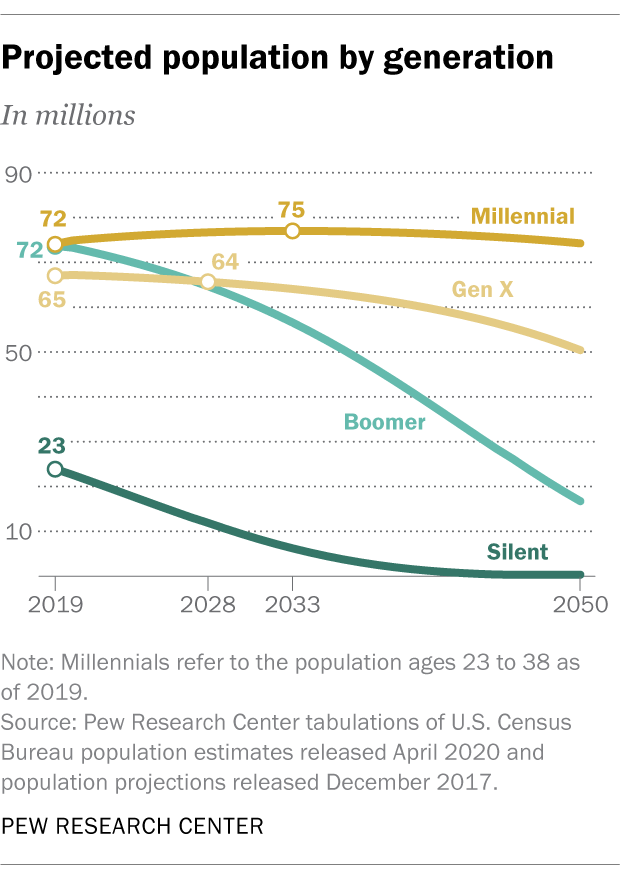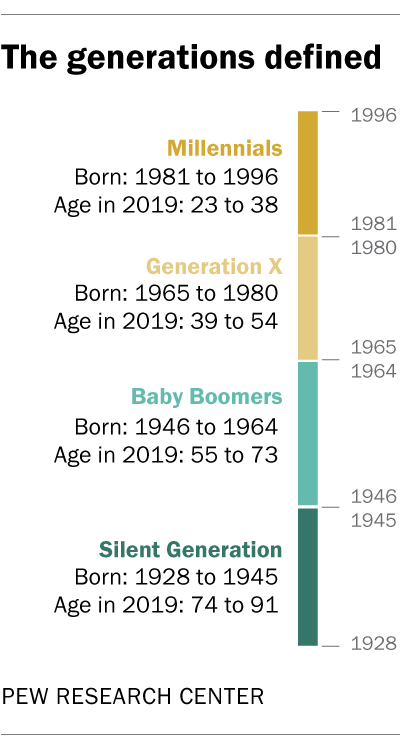Boomers, Gen X, Gen Y, and Gen Z Explained


Given this is an election year, it seems appropriate to consider the mix of the electorate in terms of generational characteristics. Currently the largest voting bloc generation is the Gen Y's ( Millennials overtake Baby Boomers as America’s largest generation ) just now surpassing the Baby Boomers (starting to fade away). As usual, the Gen Xs are a minority but still at a significant 65.2 million. Gen Z is just now starting to engage in politics while the Silent Generation is quickly becoming a non-factor (but I bet those who can vote get out and do so).
Note that Pew Research shows different numbers than the seeded article. I included their numbers, because I would go with Pew on the numbers and use the seed for demographic information on the generations. Per Pew we have:


| Generation | Size |
| Silent | 23 million |
| Boomers | 71.5 million |
| Gen X | 65.2 million |
| Gen Y (Millennials) | 72.1 million |
| Gen Z | n/a |
So what will Gen Y look for in the next PotUS?
How does Trump appeal to Gen Y?
How does Biden appeal to Gen Y?
Will Gen Y be engaged in this election or will it be carried by the old reliable Boomer generation?

What separates Generation Y from X, and is Generation Z a thing? How old is each generation? Are they really that different? It's easy to see why there is so much confusion about generational cohorts.
If you've ever felt muddled by this "alphabet soup" of names…you're not alone. The real frustration hits when you realize that Gen Y consumers will earn 46% of income in the U.S. by 2025. 1 And unless you understand who they are and what they want, you won't capture a dollar of their money. Furthermore, as one generation's spending power decreases (i.e. Boomers) another is increasing.
People Grow Older, Birthdays Stay the Same
A common source of confusion when labeling generations is their age. Generational cohorts are defined (loosely) by birth year, not current age. The reason is simple, generations get older in groups. If you think of all Millennials as college kids (18 - 22), then you are thinking of a stage in life and not a generation. Millennials are out of college and that life stage is now dominated by Gen Z.
Another example, a member of Generation X who turned 18 in 1998 would now be nearly 40. In that time, he or she cares about vastly different issues and is receptive to a new set of marketing messages. Regardless of your age, you will always belong to the generation you were born into.
As of 2019, the breakdown by age looks like this:
-
Baby Boomers : Baby boomers were born between 1944 and 1964. They're current between 56-76 years old (76 million in U.S.)
-
Gen X : Gen X was born between 1965 - 1980 and are currently between 41-55 years old (82 million people in U.S.)
-
Gen Y : Gen Y, or Millennials, were born between 1981 and 1996. They are currently between 26-40 years old.
-
Gen Y.1 = 25-29 years old (31 million people in U.S.)
-
Gen Y.2 = 29-39 (42 million people in U.S.)
-
-
Gen Z : Gen Z is the newest generation to be named and were born between 1995 and 2015. They are currently between 5-25 years old (nearly 74 million in U.S.)
The term "Millennial" has become the popular way to reference both segments of Gen Y (more on Y.1 and Y.2 below).
Realistically, the name Generation Z is a place-holder for the youngest people on the planet. It is likely to morph as they leave childhood and mature into their adolescent and adult identities.
Why are generations named after letters?
It started with Generation X, people born between 1965-1979. The preceding generation was the Baby Boomers, born 1944-1964. Post World War II, Americans were enjoying new-found prosperity, which resulted in a "baby boom." The children born as a result were dubbed the Baby Boomers.
But the generation that followed the Boomers didn't have a blatant cultural identifier. In fact, that's the anecdotal origin of the term Gen X — illustrating the undetermined characteristics they would come to be known by. Depending on whom you ask, it was either sociologists, a novelist, or Billy Idol who cemented this phrase in our vocabulary.
From there on it was all down-alphabet. The generation following Gen X naturally became Gen Y, born 1980-1994 (give or take a few years on either end). The term "Millennial" is widely credited to Neil Howe, along with William Strauss. The pair coined the term in 1989 when the impending turn of the millennium began to feature heavily in the cultural consciousness.
Generation Z refers to babies born from the mid-2000s through today, although the term isn't yet widely used. This may signal the end of 'alphabet soup' (it does coincide with the literal end of the alphabet, after all). A flurry of potential labels has appeared, including Gen Tech, post-Millennials, iGeneration, and Gen Y-Fi.
Splitting Up Gen Y
Javelin Research noticed that not all Millennials are currently in the same stage of life. While all millennials were born around the turn of the century, some of them are still in early adulthood, wrestling with new careers and settling down, while the older millennials have a home and are building a family. You can imagine how having a child might change your interested and priorities, so for marketing purposes, it's useful to split this generation into Gen Y.1 and Gen Y.2.
Not only are the two groups culturally different, but they're in vastly different phases of their financial life. The younger group are financial fledglings, just flexing their buying power. The latter group has a credit history, may have their first mortgage and are raising toddlers. The contrast in priorities and needs is vast.
The same logic can be applied to any generation that is in this stage of life or younger. As we get older, we tend to homogenize and face similar life issues. The younger we are, the more dramatic each stage of life is. Consider the difference between someone in elementary school and high school. While they might be the same generation, they have very different views and needs.
Marketing to young generations as a single cohort will not be nearly as effective as segmenting your strategy and messaging.
Why are generation cohort names important?
Each generation label serves as a short-hand to reference nearly 20 years of attitude, motivations, and historic events. Few individuals self-identify as Gen X, Millennial, or any other name.
They're useful terms for marketers and have a tendency to trickle down into common usage. Again, it's important to emphasize that referring to a cohort simply by the age range gets complicated quickly. 10 years from now, the priorities of Millennials will have changed — and marketing tactics must adjust instep.
Whatever terminology you use, the goal is to reach people with marketing messages that are relevant to their phase of life. In short, no matter how many letters get added to the alphabet soup, the most important thing you can do is seek to understand the soup du jour for the type of consumer you want to attract.
What makes each generation different?
Before we dive into each generation, remember that the exact years born are often disputed, but this should give you a general range to help identify what generation you belong in.
The other fact to remember is that new technology is typically first adopted by the youngest generation and then is gradually adopted by the older generations. As an example, 96% of Americans have a smartphone, but Gen Z (the youngest generation) is the highest user.
The Baby Boomer Generation

-
Boomer Birth Years : 1944 to 1964
-
Current Age : 56 to 76
-
Generation Size : 76 Million
-
Media Consumption : Baby boomers are the biggest consumers of traditional media like television, radio, magazines, and newspaper. Despite being so traditional 90% of baby boomers have a Facebook account. This generation has begun to adopt more technology in order to stay in touch with family members and reconnect with old friends.
-
Banking Habits : Boomers prefer to go into a branch to perform transactions. This generational cohort still prefers to use cash, especially for purchases under $5.
-
Shaping Events : Post-WWII optimism, the cold war, and the hippie movement.
-
What's next on their financial horizon : This generation is experiencing the highest growth in student loan debt. While this might seem counterintuitive, it can be explained by the fact that this generation has the most wealth and is looking to help their children with their student debt. They have a belief that you should take care of your children enough to set them on the right course and don't plan on leaving any inheritance. With more Americans outliving their retirement fund, declining pensions, and social security in jeopardy, ensuring you can successfully fund retirement is a major concern for Boomers.
Generation X

-
Gen X Birth Years : 1965 to 1979
-
Current Age : 41 to 55
-
Other Nicknames : "Latchkey" generation, MTV generation
-
Generation Size : 82 Million
-
Media Consumption : Gen X still reads newspapers, magazines, listens to the radio, and watches TV (about 165 hours worth of TV a month). However, they are also digitally savvy and spend roughly 7 hours a week on Facebook (the highest of any generational cohort).
-
Banking Habits : Since they are digitally savvy, Gen X will do some research and financial management online, but still prefer to do transactions in person. They believe banking is a person-to-person business and demonstrate brand loyalty.
-
Shaping Events : End of the cold war, the rise of personal computing, and feeling lost between the two huge generations.
-
What's next on Gen X's financial horizon : Gen X is trying to raise a family, pay off student debt, and take care of aging parents. These demands put a high strain on their resources. The average Gen Xer carries $142,000 in debt, though most of this is in their mortgage. They are looking to reduce their debt while building a stable saving plan for the future.
Millennials (Gen Y)

-
Millennial Birth Years : 1980 to 1994
-
Current Age : 26 to 40
-
Other Nicknames : Gen Y, Gen Me, Gen We, Echo Boomers
-
Generation Size : 95 Million
-
Media Consumption : 95% still watch TV, but Netflix edges out traditional cable as the preferred provider. Cord-cutting in favor of streaming services is the popular choice. This generation is extremely comfortable with mobile devices but 32% will still use a computer for purchases. They typically have multiple social media accounts.
-
Banking Habits : Millennials have less brand loyalty than previous generations. They prefer to shop product and features first and have little patience for inefficient or poor service. Because of this, Millennials place their trust in brands with superior product history such as Apple and Google. They seek digital tools to help manage their debt and see their banks as transactional as opposed to relational.
-
Shaping Events : The Great Recession, the technological explosion of the internet and social media, and 9/11
-
What's next on their financial horizon : Millennials are entering the workforce with high amounts of student debt. This is delaying major purchases like weddings and homes. Because of this financial instability, Millennials prefer access over ownership which can be seen through their preference for on-demand services. They want partners that will help guide them to their big purchases.
Gen Z

-
Gen Z Birth Years : 1995 to 2019
-
Currently Aged : 5 to 25
-
Other Nicknames : iGeneration, Post-millennials, Homeland Generation
-
Generation Size : Roughly 25% of the population
-
Media Consumption : The average Gen Zer received their first mobile phone at age 10.3 years. Many of them grew up playing with their parents' mobile phones or tablets. They have grown up in a hyper-connected world and the smartphone is their preferred method of communication. On average, they spend 3 hours a day on their mobile device.
-
Banking Habits : This generation has seen the struggle of Millennials and has adopted a more fiscally conservative approach. They want to avoid debt and appreciate accounts or services that aid in that endeavor. Debit cards top their priority list followed by mobile banking. Over 50% have not entered a bank branch in at least 3 months.
-
Shaping Events : Smartphones, social media, never knowing a country not at war, and seeing the financial struggles of their parents (Gen X).
-
What's next on Gen Z's financial horizon : Learning about personal finance. They have a strong appetite for financial education and are opening savings accounts at younger ages than prior generations.
If you want to know more about Gen Z, check out this deep dive into their media consumption and banking habits.
Do Generations Use Technology Differently?
Younger generations have often led older Americans in their adoption and use of technology, and this largely holds true today.
Although Baby Boomers may trail Gen X and Millennials on native technology usage, the rate at which Boomers expand their use of technology is accelerated.
In fact, Boomers are now far more likely to own a smartphone than they were in 2011 (68% now vs. 25% then).
Do Generations Bank Differently?
Absolutely, and for several reasons.
-
Each generation has been in the workforce for different lengths of time and accumulated varying degrees of wealth.
-
Baby Boomers have an average net worth of $1,066,000 and a median net worth of $224,000.
-
GenXers average net worth is around $288,700, but the median is $59,800.
-
Millennials have an average net worth around $76,200, but their median net worth is only $11,100
-
Gen Z's average net worth is difficult to report on since so much of the generation has no net worth or career.
-
-
Each generation is preparing and saving for different life stages; be that retirement, children's college tuition, or buying a first car.
-
Each generation grew up in evolving technological worlds and has unique preferences in regard to managing financial relationships.
-
Each generation grew up in different financial climates, which has informed their financial attitudes and opinions of institutions.
Are generations the best way to categorize consumer behavior?
Knowing generational trends is important, as they can unveil similar attitudes and behaviors among consumers who experienced world events at the same life stage as their cohorts. And it doesn't hurt to understand these age groups since marketing tools and audience segmentations generally include age as a factor. But the generations don't tell the whole story and their behaviors can be hard to lock down. After all, every generation grows up. So. can you rely on age ranges alone? Here's what we think .







Maybe a different way for us to talk about politics this year. Hopefully in a thoughtful manner.
Being a pre baby boomer I'm not represented in the groups mentioned.
That may be a good thing.
Maybe that is fitting given you are a member of the Silent Generation.
My wife and family would beg to differ with you on that..LOL
'so-called' Silent Generation.
Ah, much better, I can now retire my soapbox for the evening.
Actually I found the article quite interesting. Not being a part of any of the generations mentioned it did give me a chance to review and agree or disagree with how they are presented from my point of view.
I feel most aligned with the greatest generation born 1901-1924. I really feel like an outsider in my own generation.
Then you have the more recently defined "Xennial" micro generation:
I am in that micro generation. We're the generation that's mostly lost among the GenX and Millenial, but we're some kind of strange mix of the two.
I was born in '74, so I'm in the middle of Gen X. My sister was born in '78, so she's a Xennial. We're both cynical.
I'm pretty cynical too, but most of my friends are Gen X... maybe a little "nurture" there?
It's hard to call myself a Baby Boomer because I was born in 1962. I was born just as stuff was starting to get interesting with the Civil Rights Movement, Women's Lib, and the Vietnam War.
I was born in 1979... so like you, kind of stuck between two generations. I think that's why the "micro generation" came about. Those of us at the tail end of Gen X and the first of the Gen Y [aka Millenials], don't feel a part of either generation, generally speaking.
I always consider the Boomers as the ones born right after the second world war.
I never considered them up until 64.
More like my parents and a little before generations.
There was two distinct cohorts within the baby boomers. The post war boom occurred, but had started to recede until start of the Korean war, which saw an acceleration until 1957/1958. The period of 1945~1953 were sometimes referred to as post war and the remainder as the Jones Generation. I don't know why. The average age of marriage started during the 40s (24.3 for males, 21.5 females) to 50s and mid 60s (22.8 male, 20.3 female). Draft rules and eligibility was a significant factor, imo, as the average age rose rather quickly thereafter, along with birth control being more readily available.
I was late stage silent and didn't really fit in with some of the older members of that generation, as it was not uncommon for those older ones to be veterans of WWII or Korea.
Sorry but, Gen X and I don't use facebook.
My husband was born in 1970, he refuses to get on any social media. I think us tail-end Gen Xers are the ones that are on Facebook.
Close to me. I am 67. Old enough to remember the first computers. Haha
Even though I was born in 79, I still remember some nasty early computers!
Our first computer game you basically had to picture in your mind. It was a weird game that went something like this...
You are standing in a room.
Then you had to type, look right.
I see a window.
Then you would have to type look window...
It was weird.
I remember Pong. My neighbors had it and I thought it was pretty cool
I know EXACTLY what you're talking about!
Turn right
Walk
[you come across a person]
Speak to person...
Too funny!
Carter was president when I was born.
I bought a Commodore VIC-20, when it came out in 1981....purchased at K-Mart or Target....not sure which
My first real computer was an IBM PS/1....bought at Wards in 1990.
Got online via dialup during the early 80's, first on AOL and then Prodigy
Those were fun days, guess I am a confirmed forum junkie.
My dad had one of the first Atari games that connected to the TV, and I remember playing Pong on that. Back then, he was a gadget guy - anything electronic, he'd buy. Now, he can't check his email (doubt he even has an account), and it took him a year to learn to text. He's on Facebook, though.
The first game I remember playing on a PC was Oregon Trail.
Same here. I loved that game. And...I do miss it. It was just plain 'ol fun.
You're really old!
I was born 5 months after Eisenhower's first inauguration. I do not remember him as President. I remember a bit about the Kennedy/Nixon election campaign.
Yep. I played the Oregon Trail in middle school. My family died of dysentery a lot.
They still make it for consoles and PC. I almost bought one for my kids to try, but it was expensive.
Man, I must be an old fart. The first game I remember playing on a PC was solitaire
I was in elementary school. It was a little K-8 school where we had two computers, and each class took turns using them for a few months at a time. I remember getting a stern lecture from our 4th-grade teacher about making sure to always turn them off properly so they'd reboot, and handling floppy discs (remember them?) gently and never laying them near a strong electrical current, or they'd be scrambled.
Can't have them by magnets either!
Nah... I don't even think solitaire was on PC until a little later [post Oregon Trail]. I might have to take a look at that. I know the Oregon Trail I played was on an old Atari Green Screen PC with floppy disc.
Ok...I never even saw a PC until I joined the Air Force in 1987.I didn't have a work PC until 1997 when I started working where I am now. I then bought my own personal PC in 1999 or thereabouts.
So I am totally clueless about Oregon Trail.
Never heard of it. Sounds like it was fun, tho
I think our school's computers were IBM PC IIs, but I'm not sure. That's also what we had when I went to middle school in another town, and actually had a classroom with about 8 computers. When that school added some new classrooms for industrial arts (required class) and computer literacy (not required, the irony), the new computer lab had Macs, but I'm not sure what model.
My county schools were generally excellent, but really lagged in teaching computer literacy. When I finished 8th grade, I could do precise drafting with a pencil, ruler, and protractor (a mostly obsolete skill today), but couldn't do even simple troubleshooting on a computer. My skills were limited to checking for dust on the disk and "did you try turning it off and back on again."
Exchange students from Europe were much more comfortable with computers than any of us were. One nearly got suspended for hacking into the computer teacher's files to find the answer key to our most recent test, but the principal realized that if he could hack the files, he surely didn't need the test answers. He was just doing it to prove that he could.
I usually made it to Oregon. The key was to learn exactly when to hit the key to shoot your rifle when the deer was running across the screen. If you didn't learn that, your family died of starvation.
There were other things that could get you, though. Disease, or a mule dying.
We started out with Atari green screens but ended up on Macs too I think. It's been so dang long!
Hilarious about the hacking though!
Yeah... dysentery, typhoid, exhaustion... oxen dead...
That's right, oxen. It's been too long.
I am of the Baby Boomer generation (Dad was a WW2 vet) and I refuse to use Facebook. My friends who do mostly use it to check on their kids.
Born in 62 , Im one of the last boomer generations , my ex was a gen x .
I have had some discussions with friends about when different gens ended or started , and no one really seems to be able to agree on specific years . one I recently heard mentioned was Gen A, those born entirely in the 2000s and thus have an entirely different millinium to start with.
Im sure there will be some adjusting once those of us born in the last century and millinium are gone.
I'm one of the last of the baby boomers in 1960. I was a techy kid, so I was using computers in high school. We were part of that in-between group of kids that some went off to Nam, and others who's birthdays came out right, didn't have to register, since they did away with the draft.
I have two borderline Millennials/Gen Z's who will turn 26 this Aug.
There are moments I feel a generation gap. but not too much.